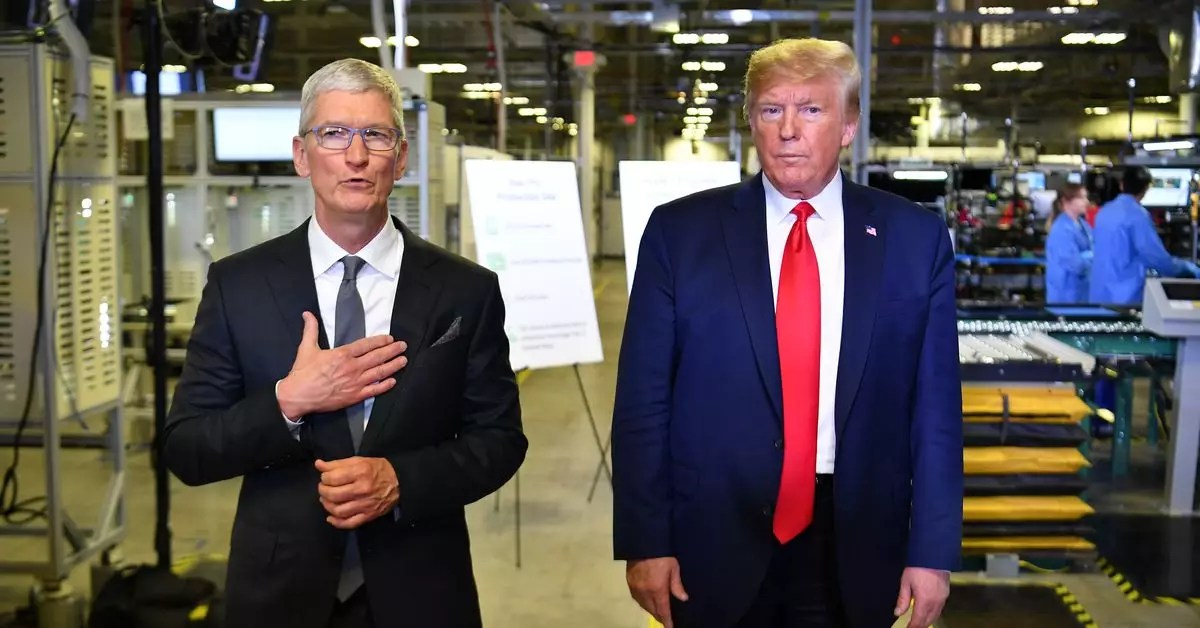In a landscape where corporate leaders typically sidestep direct engagement with governmental figures, Tim Cook, the CEO of Apple, carved a unique niche by cultivating a personal rapport with former President Donald Trump. This relationship, as explored in a recent Wall Street Journal exposé, exposed a blueprint of influence that other tech executives have eagerly sought to replicate. Cook’s effectiveness hinged primarily on his commitment to establishing a straightforward and personal line of communication with Trump, which starkly contrasted with the traditional lobbying strategies employed by his peers.
Unlike many of his contemporaries who rely heavily on government relations teams and professional lobbyists, Cook embraced a more minimalist approach. He opted for direct communication, utilizing meals and phone calls to penetrate the often-opaquely guarded realm of presidential decision-making. This approach allowed him to sidestep the complexities that typically hinder negotiations; by keeping dialogues focused and succinct, Cook ensured that each meeting remained centered on specific objectives. The simple yet effective strategy of presenting one key data point during their discussions exemplified this tactic, effectively allowing him to steer conversations without losing momentum.
Cook’s ability to align Apple’s corporate agenda with Trump’s political priorities further solidified this mutually beneficial relationship. The Wall Street Journal notes that Cook managed to highlight shared interests, particularly in economic growth and job creation, making it easy for Trump to support policies favorable to Apple. This element of mutual benefit became a cogs-and-gears relationship; as Trump enacted tax cuts and eased tariffs that significantly aided Apple, Cook provided Trump with positive public relations by refraining from countering his claims about Apple’s operational decisions, even when inaccuracies were involved.
Following the Playbook
The allure of Cook’s strategies has not gone unnoticed by other business leaders. Executives from major companies like Boeing and FedEx have reportedly attempted to mimic Cook’s approach, choosing to communicate directly with Trump rather than relying on traditional lobbying avenues. This desire to forge personal connections highlights a shifting paradigm in corporate-government interactions. Some in the tech sector, understanding the power of goodwill, have even considered leveraging Trump’s interest in celebrity and public acknowledgment. The effectiveness of Cook’s tactics has set a new bar for engagement between corporate America and Washington.
The Flattery Factor
In a similarly opportunistic vein, other prominent tech leaders, including Sundar Pichai of Google and Mark Zuckerberg of Meta, have reportedly sought to curry favor by directly praising Trump’s policies and actions. This flattery-driven approach serves not only to secure a favorable standing with influential figures but also to ensure that these tech magnates can navigate the often-tumultuous waters of political relations with greater ease. The implications are profound for the evolving relationship between technology giants and political landscapes, redefining how influence can be exercised.
The case of Tim Cook and Donald Trump underscores a significant trend toward personal diplomacy in corporate governance. By focusing on simplified and direct engagement, Cook managed to not only influence key policies that benefited Apple but also set a precedent for other tech leaders. As the corporate world grapples with an increasingly complex political arena, the lessons learned from this relationship could well signal a transformative moment in how executives approach their interactions with government officials. The future might see more leaders adopting a similar methodology as they navigate their paths through the corridors of power.


Leave a Reply